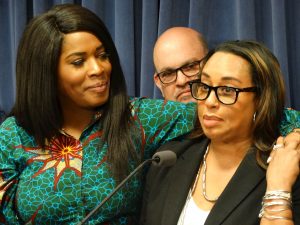New year brings a higher minimum wage, hundreds of state laws
By Jerry Nowicki Capitol News Illinois — January 1, 2020
: Rep. Jehan Gordon-Booth (left) and Sen. Toi Hutchinson, key sponsors in their respective chambers of a bill to legalize recreational marijuana in Illinois, speak at a news conference May 30 at the Capitol in Springfield to discuss what passage of the bill would mean to minority communities, which they say have been unfairly targeted by law enforcement as part of the national war on drugs. Legalization was approved by the General Assembly before the end of the spring session and goes into effect Jan. 1. Hutchinson later stepped down from her Senate seat to become the senior advisor to the governor for cannabis control. (Capitol News Illinois Photo by Peter Hancock/Capitol News Illinois)
SPRINGFIELD — The state’s minimum wage will increase by $1 hourly, recreational marijuana will go on sale to those over 21 years of age, and some state taxes and licensing fees will increase when the calendar hits January.
The changes are among hundreds resulting from laws passed during a busy legislative session which adjourned in early June.
Minimum Wage: The minimum wage will increase by $1 to $9.25 hourly on Jan. 1, the first such increase since 2010. The wage will increase to $10 hourly in July before increasing $1 each January until it hits $15 by 2025.
Marijuana Legalization: With the legalization of adult-use marijuana in the state, Illinois residents will be allowed to possess 30 grams of cannabis flower, 500 milligrams of a marijuana-infused product and five grams of cannabis concentrate. Non-residents can possess half those amounts.
Consumption of marijuana will still be banned in public places, however, unless a licensed marijuana facility or certain lounges obtain local government clearance for allowing use at their facilities.
Marijuana legalization will also provide for the expungement of low-level cannabis convictions and criminal records in the state, the first of which were filed in Chicago this month.
New Taxes, Fees for Capital Plan: Some new taxes and fees, which will help fund a multi-year $45 billion capital infrastructure plan will also take effect starting in January.
Registration fees for passenger vehicles will increase to $151 from $101, while electric vehicle registration fees will increase to $251 annually from $34 every other year.
The licensing fee for a trailer weighing less than 3,000 pounds will increase to $118 from $18, with every weight class above that also seeing a $100 increase.
A new tax on parking garages will also take effect next month, with a 6 percent rate applied to hourly and daily garages and a 9 percent rate applied to monthly.

State Rep. Will Guzzardi joins activists on the Capitol rotunda after the bill to raise the state’s minimum wage to $15 by 2025 passed the Illinois House on Feb. 14. The legislation, sponsored by Guzzardi, a Chicago Democrat, passed along partisan lines 69-47-1. It had previously been approved by the Senate, and was signed into law by Gov. J.B. Pritzker on Feb. 19. The law goes into effect with the first of multiple rate increases Jan. 1. (Photo by Jerry Nowicki/Capitol News Illinois)
The state will also begin taxing the value of traded-in vehicles starting after $10,000 of value, down from $20,000.
Other New Laws
- The maximum fine for a hitting a construction worker with a vehicle will increase to $25,000 from $10,000.
- Those violating “Scott’s Law” by failing to reduce speed or change lanes when an emergency vehicle is stopped on the side of the road will see increased fines in the new year as well. The minimum fine for a first offense will increase to $250 from $100, while the minimum for a second offense will be $750.
- Money collected from such violations will go to a Scott’s Law Fund to produce driver education materials. The maximum fine will remain at $10,000. The law also increases the severity of violations that result in the death or harm to a first responder to a class 2 felony.
- Passing a stopped school bus that has its “STOP” arm extended will now result in a $300 fine, up from $150 for the first offense. The second offense will cost drivers $1,000, up from $500.
- Public locations must convert single-occupancy restrooms into all-gender restrooms and designate them for use by no more than one person at a time, or for families or assisted use. Public locations must change exterior signage as well.
- Public buildings will be required to have baby changing facilities in any of their public restrooms.
- The burial benefit for a firefighter, state police or local law enforcement officer killed in the line of duty will increase to $20,000 from $10,000.

Don Welge, president and CEO of Gilster-Mary Lee, a family and privately held food manufacturer headquartered in Chester, holds up a box of macaroni and cheese, which he said could become a money-losing product for his company if the minimum wage increase legislation becomes law. Welge and other business owners spoke during a news conference Feb. 11 at the Capitol in Springfield. The minimum wage increase was approved by the Legislature and signed by Gov. J.B. Pritzker by Feb. 19. (Photo by Jerry Nowicki/Capitol News Illinois)
- The Illinois secretary of state will be required to allow applicants to choose between “male,” “female” or “nonbinary” when designating the applicant’s sex on their driver’s license or ID card.
- Any report received by the Department of Children and Family Services alleging the abuse or neglect of a child by a person who is not the child’s parent or immediate family must immediately be referred to the appropriate local enforcement agency and state’s attorney for consideration of criminal investigation or other action.
- Diesel trucks will be prohibited from idling for more than 10 minutes within one hour if the vehicle is within 200 feet of a residential area.
- Graduate assistants will no longer be classified as “students,” but rather as “employees,” which grants them the right to collectively bargain.
- Insurers in the state will be required to cover the costs of medically necessary epinephrine injectors, commonly referred to by the brand name EpiPen, for persons under 18 years old.
- Hospitals must post information on how to enroll in health insurance through the Illinois health insurance marketplace.
The Illinois Senate Democratic and Republican caucuses have each compiled lists of new laws available at their respective websites, illinoissenatedemocrats.com and senategop.state.il.us.
Jnowicki@capitolnewsillinois.com







